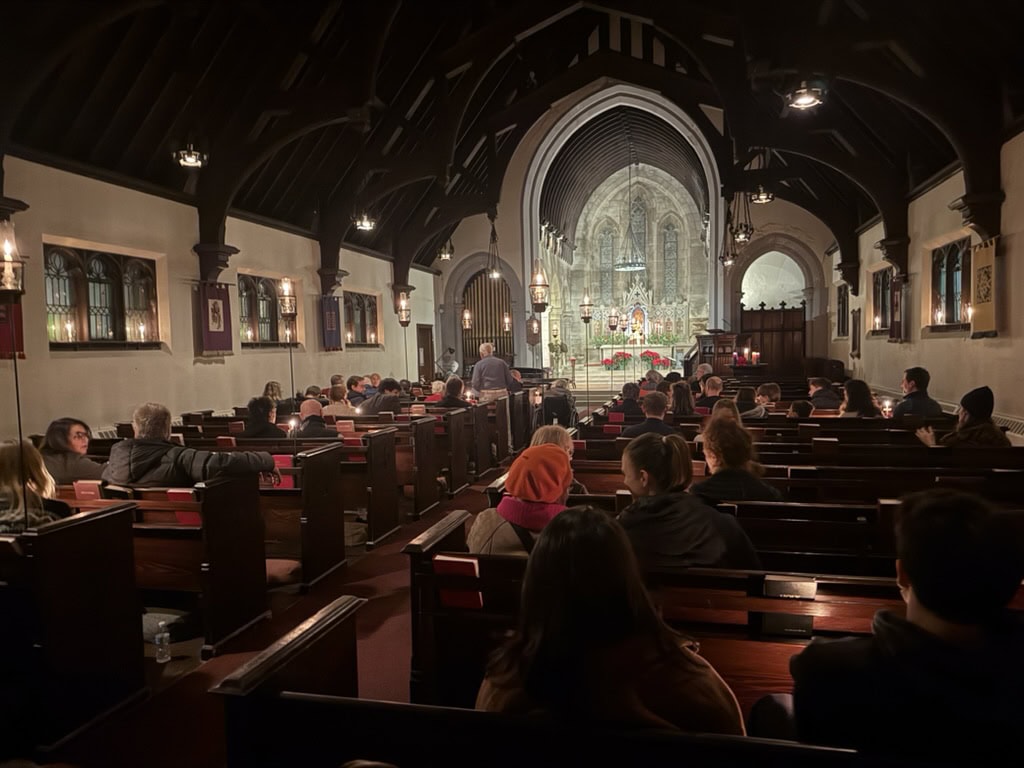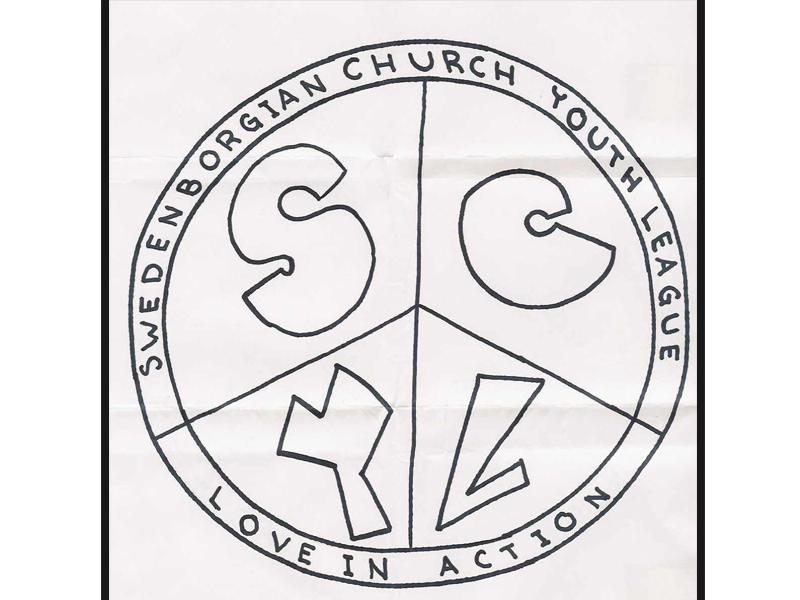By Rev. Betsy Coffman
“This is Holy Ground, we’re standing on Holy ground, for the Lord is present, and where he is, is Holy…” “Spirit, Spirit of gentleness, Blow through the wilderness, calling and free. Spirit, Spirit of restlessness, stir me from placidness, Wind, Wind on the sea—over the eons you called to each thing…You call from tomorrow. You break ancient schemes…with bold new decisions your people arise.” My message tonight is “Called by the Spirit.”
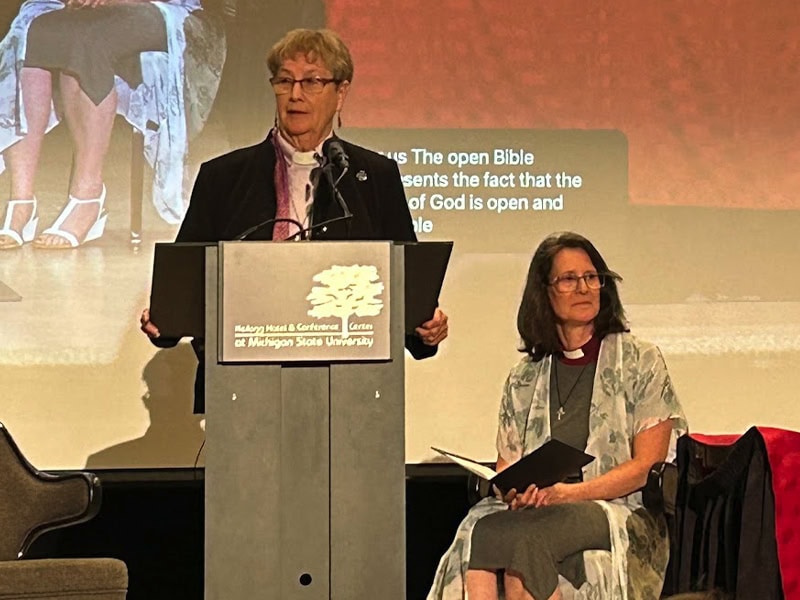
Rev. Catherine Lauber, 2026 Convention Preacher.
Friends, we are all, each and every one of us, “called by the Spirit.” Spirit has been calling us from “the moment of our first waking,” and it is calling us right now, in this “Holy moment” of the present, as we are gathered together, and it beckons to us into our future as well. For this Spirit, this Spirit of love and gentleness, calling and free, calls us to awaken to the life that has been gifted to each of us. As Jean Houston says, we are all Godseed. We are seeds, planted by God’s infinite love, in the soil of spirit, and of this natural earth, with all the potential of every seed, to become what we were each uniquely created to be. We are always being called into being, into becoming, by the true Source of all life, called by many names— Holy Spirit, God, Infinite Love—seeking to become manifest. This “call of the spirit” is not just one that seeks our individual response, but it is a call to us collectively as humans, and as such, is very relevant to our present Convention theme of envisioning the future of “church,” as all are called into this process of becoming, like the current of a river, flowing onward toward the sea of God-consciousness.”
And though the call is constant, our awareness of it is not. I have a friend who uses the term “spiritual amnesia” to describe our frequent forgetfulness of God’s constant presence and “calling” in our lives. The main reason that we are unable to maintain a consistent awareness of that Inner Voice is because we are “citizens of two worlds at once.” Swedenborg tells us it is part of the Divine Design that we are all spirits inwardly, spirits clothed in bodies and as such, we all have an inner self and an outer self. The outer self is the part of us that is aware and living in this physical world. It is the part of us that is able to interact with others and to carry out the necessary tasks of the earthly world. However, the inner self, of which we are mostly unaware, is simultaneously interacting at the spiritual level and is in community with angels. According to Swedenborg, our whole purpose here is to develop our inner self and character through an outer life “that leads to heaven.” And the heavenly life, which we get to choose and practice while here in our earthly bodies, is a life of “love in action,” what Swedenborg called a “life of charity.” In simple terms, this means a life in which we have genuine care and concern for others, and seek to be useful, helpful and kind, in all our affairs. As such, while here on earth, we might see ourselves as angels-in-training. There’s a wonderful scene in the film Splendors of the Spirit, about Swedenborg’s life and teachings, in which a little girl asks Swedenborg to show her an angel, and he sits her in front of a mirror and says, you’re looking at one right now. We all have an “inner self” that is an angel coming-into being, if only we heed the call to respond to our God-given destiny.
Throughout our lives this Spirit calls to us to continue to become, to change, to transform, to grow into the unique person we were created to be. It is always calling us. It is within us and around us, at all times, urging us to listen to what Abraham Lincoln called, our better angels, those loving and true voices both outside and within, that urge us to “do the next right thing” and to avoid the pitfalls of the outer self that wants to control and resist. This is a life that calls for “surrender,” for giving up our self-will and discerning the Lord’s will for us—and it is not easy—and it is ongoing. I think most of us know that don’t we? It is our ego, our need to have things our way, and our holding on to our old patterns and beliefs (ancient schemes), even if they no longer serve us, and even cause us pain, that block us from acknowledging and heeding the “call of the Spirit.” And that, in turn, blocks our spiritual growth. The passage we read from Luke, alludes to this process.
…no one puts new wine into old wineskins; or else the new wine will burst the wineskins and be spilled, and the wineskins will be ruined. But new wine must be put into new wineskins, and both are preserved. And no one, having drunk old wine, immediately desires new; for he/she says, ‘The old is better.’
How often do we wish for the old and think it was better, and have trouble embracing the new, even if, in reality, it is what we really need in order to grow and move forward? Friends, we are being called, from the old to the new, individually and as a church—the Spirit is calling for healing, and change (new wineskins). We need new ways of looking at things. To see reality from a different perspective.” Yet, when we are experiencing this process, “We might [feel as though we are] swimming against the [familiar] current, (even though) we’ve made a conscious decision to practice something different in response to an inner call.”
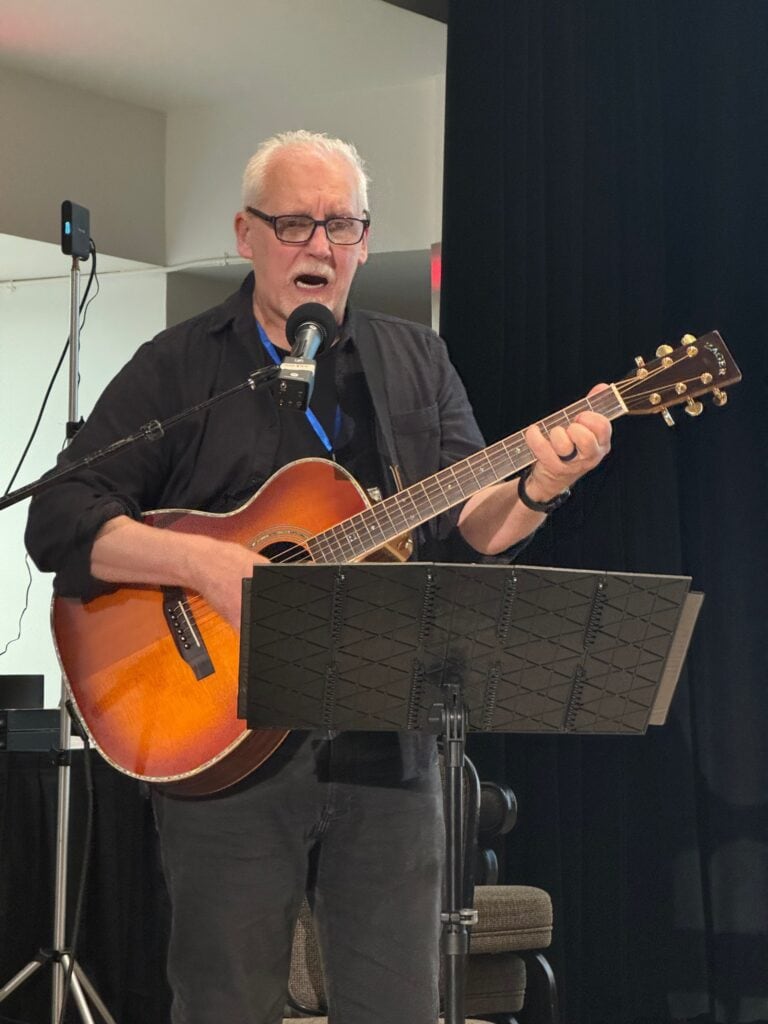
Pastor Paul Deming, plays for the
Convention Worship Service.
Spiritual writer, Gerald May, notes the significant difference in ways our “outer” and “inner” selves develop, which often leads to internal conflict as we are in the process of growing and developing as human beings. He states, In growing psychologically, (outer) one moves toward increasing autonomy and independence. In growing spiritually, (inner) one increasingly realizes how utterly dependent one is, on God and on the grace of God that comes through other people. [Will and Spirit]. And yet, both need to happen as we traverse our road towards spiritual transformation, on our journey to heaven. Somehow, we have to learn to navigate these two seemingly opposing paths. We all need to develop a healthy sense of self, develop our minds, bodies, and talents and an ability to function well in our human lives, but we are also called upon at the same time, to let God take the lead, what 12-step programs call turning our will and our lives over to the care of God… And just as important, we need to tend to our inner garden to the growth of our inner, spiritual self, at the same time that we’re operating in the outer world. That can be very difficult indeed, requiring that we develop spiritual practices that help us tune out the outer world and connect with the inner world which in turn can support and sustain us in our outer activities and interactions.
In Isaiah 40:3-5, we see wonderful imagery that illustrates this process of spirit and human activity that is part of our regenerative or transformational process. Listen,
A voice of One calling in the wilderness, prepare the way for the LORD; make straight in the desert a highway for our God. Every valley shall be raised up, every mountain and hill made low, the rough ground shall become level, the rugged places a plain. And the glory of the LORD will be revealed, and all people will see it together. For the mouth of the LORD has spoken.
Albert Barnes, in a commentary [written in 1851] on this passage, remarks on the context of these verses,
The idea is taken from the practice of Eastern monarchs, who, whenever they entered on a journey or an expedition, especially through a barren and unfrequented or inhospitable country, sent…[forerunners] or heralds before them to prepare the way. To do this, it was necessary for them to provide supplies, and make bridges, or find fording places over the streams; to level hills, and construct causeways over valleys, or fill them up; and to make a way through the forest which might lie in their intended line of march. Those who went before, to mark and improve the route, were the forerunners. They were “the scouts, the pioneers, the ones sent before a king to prepare the way.
We might recall pioneer Daniel Boone and his party of woodsmen laying out a 200-milelong route. Over time, as more people came over the trail, it was improved, widened, and smoothed. It all began, however, with one man. That man then led others, and it multiplied from there.
Filling up valleys and removing the tops of mountains seems like a lot of work …and it is, yet this is the work and the life to which the Spirit of God is always calling us, and in our answering of that call, there is a process of healing and transformation that takes place in our inner barrenness, where we may feel empty, desolate, and in need of nourishment so we can thrive. This is the work of that Spirit of gentleness, blowing through the wilderness, calling and free. Can you feel those places inside you? This passage is talking about us, and those desert and rough places inside each of us that need to be leveled and cleared in order to make a straight highway, an open path for us to “hear the voice that is calling us from the wilderness areas of our inner being.” It is calling for us to be made new and in doing so, to enlarge our ability to love. From Rumi, we hear, your task is not to seek for love, but …to seek and find all the barriers within yourself that you have built against it. And in that process, we are changed and become pathfinders and forerunners for others. Each of us in our daily interactions, in the nitty-gritty, ordinariness of our lives, has opportunities to affect the lives of others in a positive way, and in so doing, we are forging our road to heaven, while showing the way for others.
As Swedenborgians most of us are aware of two rather famous pathfinders, who did just that. John Chapman, a.k.a. Johnny Appleseed, and Helen Keller, both of them, through following their spiritual call, changed the world and influenced others in profound and beneficial ways. Johnny Appleseed traveled west into the frontier planting apple seeds, and creating orchards ahead of the settlers who came after. The apple trees he provided were the means by which they sustained themselves through the winters and the planting of trees made it possible for them to gain full ownership of their property. But along with apples trees, Johnny also planted spiritual seeds by handing out chapters from Swedenborg’s Heaven and Hell, which he called Good news straight from Heaven, as well as modeling a character and way of life that demonstrated peaceful living between settlers and natives; living in harmony with nature; contentment with very few possessions and being a friend and helper to all. There are many documented stories of his helpfulness to settlers in need. This was just one man, who lived the life to which he felt called, and in the process, positively changed and influenced much of that part of the world through which he traveled—and whose life and virtues are remembered and revered today.
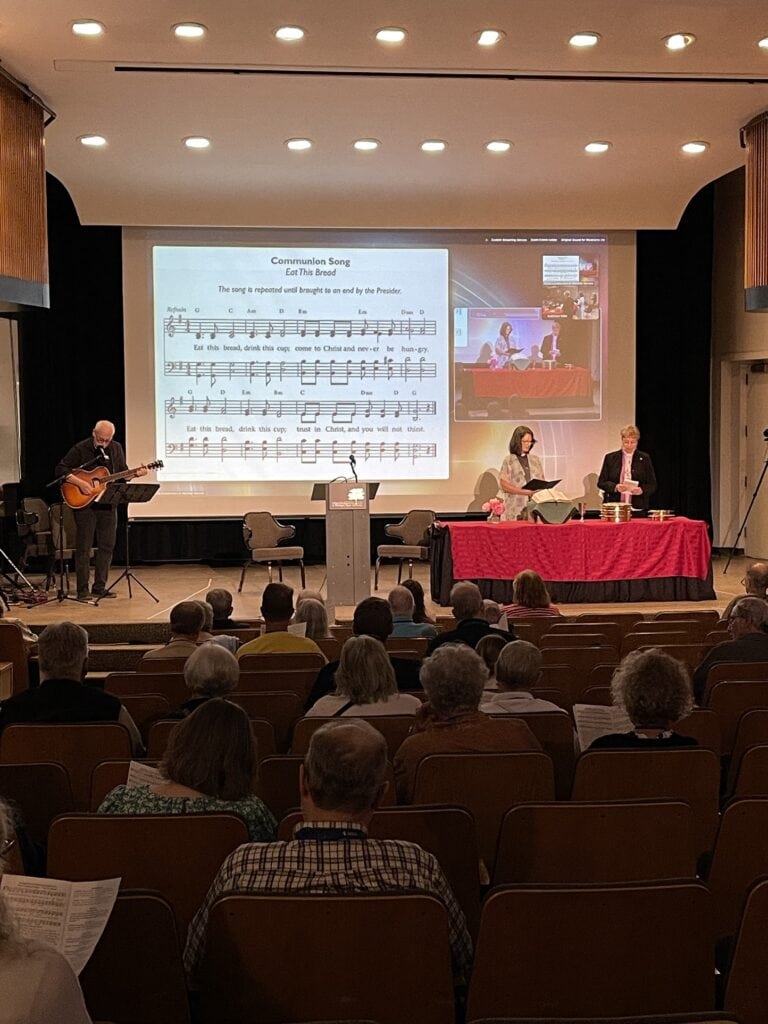
used for music throughout the worship services.
And then we have Helen Keller. Rendered deaf and blind at a very young age, in a world that had no idea at that time, how to deal with such a child, she overcame her afflictions with much support and assistance from her mother and a special teacher. She became a forerunner for the rights of women, for people with disabilities, and planted spiritual seeds through her writings, particularly, A Light in My Darkness, in which she tells her life story and how Swedenborg’s writings “opened her inner eyes,” so that she could respond to the “call of the Spirit.” In listening to her personal call, she was able to overcome the challenges of her physical limitations, actually use them to draw attention to the common misconceptions about “disabled” people of her time and advocate successfully for positive changes that were forerunners to many more that came later. Her inspiration to so many, her words and accomplishments changed our world and still resonate today. She wrote,
What I am looking for is not out there, it is in me. I am only one, but I am still one. I cannot do everything, but still, I can do something. Because I cannot do everything, I will not refuse to do the something I can do. Alone we can do so little, together we can do so much.
These were not mere words, but were true expressions of how she lived and what she was able to accomplish.
A present-day pathfinder, not so well-known, but by similarly responding to her inner call in a small but meaningful way, has helped to heal the lives of many “wounded and brokenhearted women.” Episcopal priest Becca Stevens is founder of Thistle Farms, a social enterprise run by survivors of sexual abuse, trafficking, and addiction. Stevens explains how it came about,
“My mother’s example of showing love through practical means gave me the wherewithal to open a home for women [survivors]. It was a small house for five women. I said: “Come live free for two years with no authority living with you. Live free.” I figured that’s what I would want if I were coming in off the streets or out of prison. I did it because sanctuary is the most practical ideal of all. I wanted to do the work of healing from the inside out. And that begins with a safe home. From its humble beginning, it now has thirty global partners that employ more than 1,600 women. To me, this brings to mind the parable told by Jesus in Matthew (13:31–32),
“31 The kingdom of heaven is like a mustard seed, which a man took and planted in his field. 32Though it is the smallest of all seeds, yet when it grows, it is the largest of garden plants and becomes a tree, so that the birds come and perch in its branches.”
None of these pathfinders knew what the fruits of their actions (fruits of the spirit—Galatians) would ultimately be. In fact, Rev. Stevens tells of her serious doubts about her plan. She says,
Initially, it seemed a bit ridiculous to me to think that by starting a small community, we could somehow change the world, but now, it seems more ridiculous to me to think that somehow the world will change if we don’t do something. Now, I can see that one loving gesture is practically divine. We have to do small things and believe a big difference is coming. It’s like the miraculous drops of water that seep through mountain limestone. They gather themselves into springs that flow into creeks, that merge into rivers, that find their way to oceans. Our work is to envision the drops as oceans. We do our small parts and know a powerful ocean of love and compassion is downstream. Each small gesture can lead to liberation. The bravest thing we can do in this world is not cling to old ideas or fear of judgment but step out and just do something for love’s sake. (“Do the next right thing… do what’s in front of you to do.”) Sometimes what we need most is to remind one another of how the divine is all around us, calling us to see and taste it for ourselves (Practically Divine by Becca Stevens, Nashville, TN: Harper Horizon, 2021).
Like these forerunners, we too, need to decide if we will respond to the promptings of the spirit. We have the freedom to say “yes,” “no,” or “maybe later, but not right now.” However, this Spirit, this voice crying in the wilderness of our deepest souls, tells us, This is the place, and this is the time; here and now [I AM] waiting” to break into [your] experience. To change [your] mind, to change [your] life, to change your ways. To make [you] see the world and the whole of life in a new light. To fill [you] with hope, joy and certainty for the future. This is the place, as are all places; this is the time, as are all times… This is the voice, that is both gentle and restless, and in that restlessness, calls us from the placidness of our lives. It calls us from our spiritual inertia and resistance, to move forth into that wilderness of our beings, where things may be stagnant and there is need for new growth. This Spirit calls from the deepest of our being, urging us forward into a new life. And though it starts with each of us individually, what we do affects the whole, and we each have our part to play in the building of God’s Kingdom on Earth. This is how we move forward, transforming our “earthly church” from an external form, to one that reflects God’s Divine Design and purpose. And our own seemingly small efforts can and do make a difference, even in this world of much pain and suffering. From the Talmud we hear,
Do not be daunted by the enormity of the world’s grief. Do justly, now. Love mercy, now. Walk humbly, now. You are not obligated to complete the work, but neither are you free to abandon it (Rabbi Rami Shapiro).
Friends, it is in responding to and acting upon these urges of the Spirit, that we are transformed, changed, and regenerated over the course of our lifetime, into new beings, and having developed heaven within us, we are prepared and ready for the eternal life of heaven that is our inheritance. Let us answer the call!
Prayer For Our Community
God, Lord of all creation, lover of life and of everything, please help us to love in our very small way what You love infinitely and everywhere and help us answer your call to put our love into action in our daily lives. Let us know the reality that every thing and every one is connected, and nothing stands alone. To care for one part is really to care for the whole, and so we do. Help us each day to stand for love, for healing, for the good, for the diverse unity of all creation, because we know this is what You desire: as Jesus prayed, that all may be one. We offer our prayer together with all the holy names of God, we offer our prayer together with Christ, our Lord. Amen.
The Convention Worship Service that includes Rev. Coffman’s message can be viewed in full on our YouTube Channel.
Read the full issue of the July/August 2024 Messenger

Meet Rev. Betsy Coffman
In 1994, following the retirement of Rev. Dorothea Harvey, Betsy entered the Lay Leader program offered by the Swedenborg School of Religion and received her Lay Leader Certificate in June of 1998. She served the local church in that capacity for 15 years and in June of 2013 was ordained into the ministry of the Swedenborgian Church. Betsy is currently the minister to the Urbana church.

